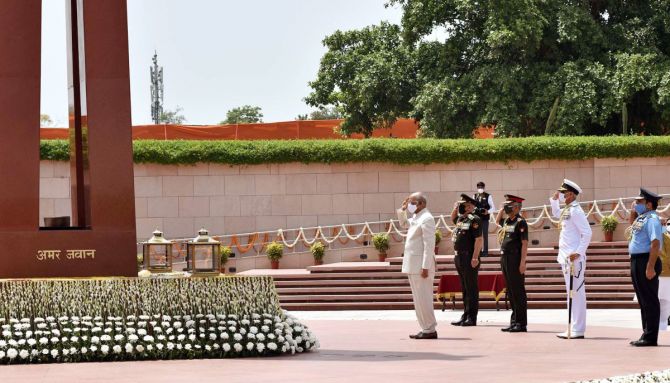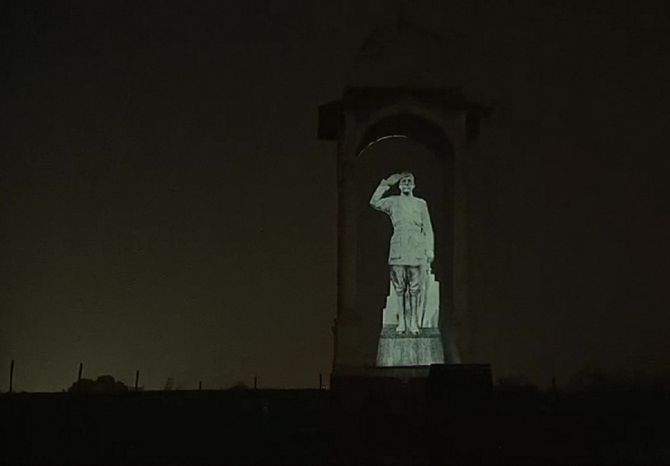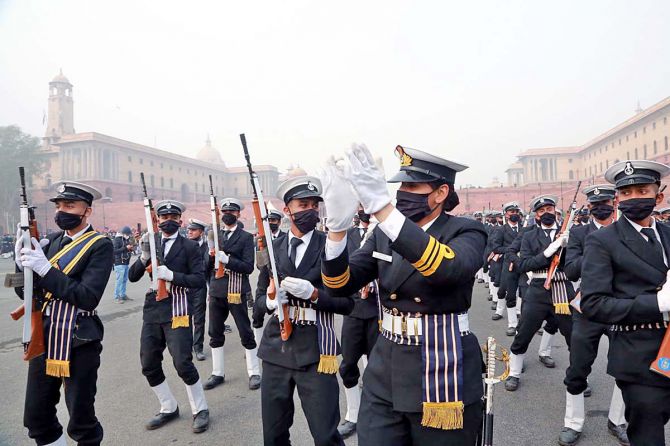'As Indians, we should be claiming and celebrating 'Bhartiyata' rather than seeking commitment to beliefs which are divisive and exclusionary.'

"For the past 60-70 years, the Indian military has been almost continuously engaged in combat. Soldiers have been fighting and dying, whether it's in Ladakh, or Kashmir or in the north east.
"Therefore, it is appropriate to remind the citizens of the sacrifice and service of soldiers, sailors and airmen who are on guard 24x7 on land, at sea or in the air," says Admiral Arun Prakash, PVSM, AVSM, VrC, VSM and a former chief of the naval staff.
The officer was honoured with the Vir Chakra for gallantry in the 1971 War.
On the eve of Republic Day, Admiral Prakash tells Rediff.com's Archana Masih that citizens themselves should come up with the initiative to commemorate military victories and honour their soldiers.
"Citizens have allowed politicians to occupy the high ground of patriotism, whereas it should belong to ordinary citizens," he says as he reflects upon how India remembers its fallen brave and if we have redeemed the promises made to every citizen by the Constitution.
As chief of the naval staff, you have honoured Indian soldiers killed in action at the Amar Jawan Jyoti. What emotions does it evoke?
Did you feel a sense of incongruity that the memorial did not do true justice to India's fallen because it commemorated those who perished in the wars of the British Empire?
I have always experienced a sense of awe and reverence whenever I paid my respects at the Amar Jawan Jyoti.
Yet, I was always conscious that the India Gate was a memorial to Indian and British soldiers who fell in World War I and the Third Afghan War -- but that did not detract from the sense of reverence or deep respect for our fallen soldiers.
Quite apart from that, at least my generation, was conscious that we deserved and required a National War Memorial to remember those who had fought and died for the country in wars after Independence.
I felt the need for this even as a young officer, and a National War Memorial (NWM) in New Delhi had been a demand or request of long-standing by the Services. When I was Chairman, Chiefs of Staff Committee, I recall that the NWM used to be one of the perennial agenda points for consideration by the government.
Therefore, when the present government conceded the request, and actually built the NWM, it brought a sense of fulfilment and satisfaction for the Services to finally have a memorial with the names of all soldiers, sailors, airmen killed in action inscribed in stone.
Do you feel the controversy about shifting the flame from Amar Jawan Jyoti to the National War Memorial is misplaced and distracting from the occasion of Republic Day?
The so-called controversy which has arisen in the media and social media is totally uncalled for. Also, an element of politics has been injected into both sides of the argument which, frankly, is totally unnecessary.
In my personal perception, I have always thought of the Amar Jawan Jyoti and cenotaph at India Gate as a temporary arrangement to honour India's Unknown Soldier, until a National War Memorial was erected. The fact that it was marked by, what is known as the 'battlefield cross,' (a reversed rifle, with a helmet on it) and not a granite or marble symbol, seemed to confirm its temporary status.
The inauguration of the NWM [in 2019] was the fulfilment of a long-standing wish of the military and it has rightly become the focus of attention. Hence, re-location or merging the two flames is perfectly alright.

Abide With Me has been removed from the Beating Retreat ceremony this year. Is there a political motive behind it or is it the government's agenda to rid India of colonial influences like this hymn?
The elimination of Abide With Me from the musical score of Beating Retreat was unnecessary for two reasons.
Firstly, Beating Retreat is a ceremonial military tradition, inherited from the British, which marks the retreat of troops to barracks after battle -- in this case, the conclusion of Republic Day parades etc, and return of troops who come from all over the country to participate to New Delhi for this event. This ceremonial military function brings an official closure to Republic Day festivities.
The Beating Retreat ceremony comprises a recital of martial music by massed bands of the Army, Navy and Air Force, accompanied by marching and counter-marching manoeuvers by the bandsmen.
As an aside, military marches have universal appeal and there are British, American, German and Japanese marches in the repertoire of our bands.
However, since Independence, the corps of musicians in the services have also composed many Indian marches adopted from folk songs and ragas. Hence the services have an eclectic medley of martial music.
Since the Beating Retreat ceremony -- a practice inherited from the British as I said -- is being retained, I see no reason for rejecting Abide With Me, perhaps because it happens to be a Christian hymn.
Abide With Me may not be a piece of martial music; but for decades, its haunting strains have formed the concluding item of the ceremony. The main significance of this composition, and the reason for its inclusion is sentimental; because it happened to be Mahatma Gandhi's favourite hymn.
We should have retained this piece, not only because it marked a sign of respect to Gandhiji, but also because it's a fine piece of music, and was a fitting finale to the Beating Retreat ceremony.
Finally, this piece did not prevent us from adding any number of Indian compositions to the evening's score.
Many traditions of the Indian armed forces have been inherited from the British. Do you think that there is some attempt to perhaps get rid of those influences and bring a more Indian ambience?
Should there be a synthesis of Indian influences with the best that has been inherited from the British?
The three services of the Indian Armed Forces are the creation of the British. The Army has its genesis from the Presidency armies, Navy from the Royal Indian Navy and Air Force from the Royal Indian Air Force.
Hence, most of the service and regimental customs, traditions and ceremonials are inherited from the British. This is a fact of life, and to say that this marks a 'colonial mindset' or make a big fuss about it, is unrealistic.
Continuously harping on our colonial past or trying to deny it, displays a sense of insecurity and perhaps even an inferiority complex.
Having said that, let us also note, that in the 75 years since Independence, the services have eliminated many customs, traditions and ceremonials, which had no relevance or functional significance or were mere symbols of an unpleasant past.
At the same time, they have adapted many new customs, ceremonials and drills which are more relevant to our own culture and which establish a connect with our Jawans.
We take the best of different cultures and have assimilated it with our own traditions. This process is already underway and should be allowed to take its logical path, without getting fixated and making a fetish of this issue.
If we look around at other militaries which have emerged from ancient cultures and civilisations -- the Japanese, Chinese, Turks, Iranians etc -- we will find that wherever they saw merit they have adopted and absorbed elements from other cultures.

This controversy about the Amar Jawan Jyoti was aggravated by two Army veterans calling Indian soldiers who fought in the two Great Wars as 'mercenaries'. Considering that some of our greatest soldiers of the 1950s, 1960s and 1970s learnt their soldiering skills by fighting in World War II, isn't such a description cruel and misplaced?
It is incorrect and most inappropriate to call our warriors of the past mercenaries. Historically, India has never had a system of conscription, and all armies, no matter who raised them, have been volunteers.
Those who joined the British Indian Army swore an oath to the government of the day (the fact that it wasn't a government of their choice is irrelevant). Having sworn an oath, these men showed steadfast loyalty to it, and fought all over the world, for their regiments, officers and comrades, displaying tremendous courage under fire, at the risk of life and limb.
Calling them 'mercenaries' is a sign of misguided thinking. I don't think the media should pay more attention to it.

Do you think every major city should have a war memorial? Mumbai, for instance, has none even though it is home to the Western Naval Command. The one in Kargil is out of reach of most Indians; the new one in Rezang La is one that only soldiers posted in that theatre would visit. How can this anomaly be addressed?
There should be more war memorial in different parts of the country because the armed forces personnel are drawn from villages and towns across India. It is only appropriate that citizens should remember their service and sacrifice and pay homage to them at every possible opportunity.
In India, for some reason, the armed forces have been ignored by the public for many years. For the past 60-70 years, the Indian military has been almost continuously engaged in combat. Soldiers have been fighting and dying, whether it's in Ladakh, or Kashmir or in the north-east.
Therefore, it is appropriate to remind the citizens of the sacrifice and service of soldiers, sailors and airmen who are on guard 24x7 on land, at sea or in the air.
Citizens, themselves, should come up with the initiative to commemorate military victories and to honour soldiers. When common citizens do it on their own, then it becomes a spontaneous public endeavour. But if sponsored by a political party, political capital will be derived out of it.
Citizens have allowed politicians to occupy the high ground of patriotism, whereas it should belong to ordinary citizen. The only loyalty we, as Indians, should be claiming and celebrating is 'Bhartiyata' rather than seeking commitment to beliefs which are divisive and exclusionary.
In most other countries there are roads, squares and statues that honour soldiers, but in our country most statues are of politicians with some dedicated to religious figures or scholars. There is nothing wrong in that, but there should be more war memorials, statues, roads named after the brave who die in the service of the country.
'Remembrance Day' is celebrated in the Commonwealth to commemorate the signing of the Armistice in 1918 which ended World War I. In Britain, citizens wear a poppy flower on that day to remember the veterans.
Some veterans in India led by Major General Ian Cardozo started a campaign to display a marigold on December 7 [Armed Forces Flag Day] in remembrance of our men who gave their lives for the country, but it hasn't caught on. This is an excellent idea.

Is it time for the ministry of defence to create a digital war memorial accessible to Indians?
If Netaji can be present in a hologram, why can't Captain Mulla or Lance Naik Albert Ekka or Quarter Master Abdul Hamid be present digitally with their saga of valour told in the many languages of the India Union?
There are already some Web sites and blogs devoted to such issues. But there's no substitute for having an actual war monument built in stone, granite or marble in a prominent position in the city.
Netaji's statute will be another befitting acknowledgement of his contribution to our freedom struggle. While installing Netaji's statue is a fine, overdue gesture, we need to ensure that it goes beyond mere symbolism. By that, I mean that we must also remember the values and principles that Netaji stood and fought for; else erecting a statue will be meaningless.
Let us recall that the two expatriate armies he raised -- the Indian National Army in Singapore and the Indian Legion in Germany -- represented his vision for the future of India. The INA's motto was 'Ittehad, Itmad aur Qurbani (unity, faith, and sacrifice)', whereby he envisioned a united and secular India, in which there would be no distinction of caste, creed or religion.
It will hypocritical if we only erect a statue and ignore the principles he stood for.
Similarly, we call Gandhiji the Father of the Nation, and at the same time, there are those who celebrate and honour his assassin.
An opinion in the London Times in 1919 alluded to Herbert Baker, the architect of Delhi, who said: 'A war memorial should express not only the idea of honour to the dead, but also the ideals they fought for'. Do you believe this thought is incapsulated in our memorials to soldier?
Herbert Baker is right when he said that our monuments should not only be stone and granite, but also stand for the principles of those we honour.

What are the thoughts that come to your mind as a soldier on the eve of Republic Day? What message would you have for us?
The grand spectacle of the military parade, and display of weapons and soldiers marching on Rajpath is only one aspect of Republic Day.
The actual symbol and significance of Republic Day is the adoption of the Constitution of India and the values and principles it enshrines. We need to reflect and introspect if we have redeemed the promises made to every citizen of India by the Constitution. And if not, why not. That is more important than the military parade.
Feature Presentation: Aslam Hunani/Rediff.com











 © 2025
© 2025